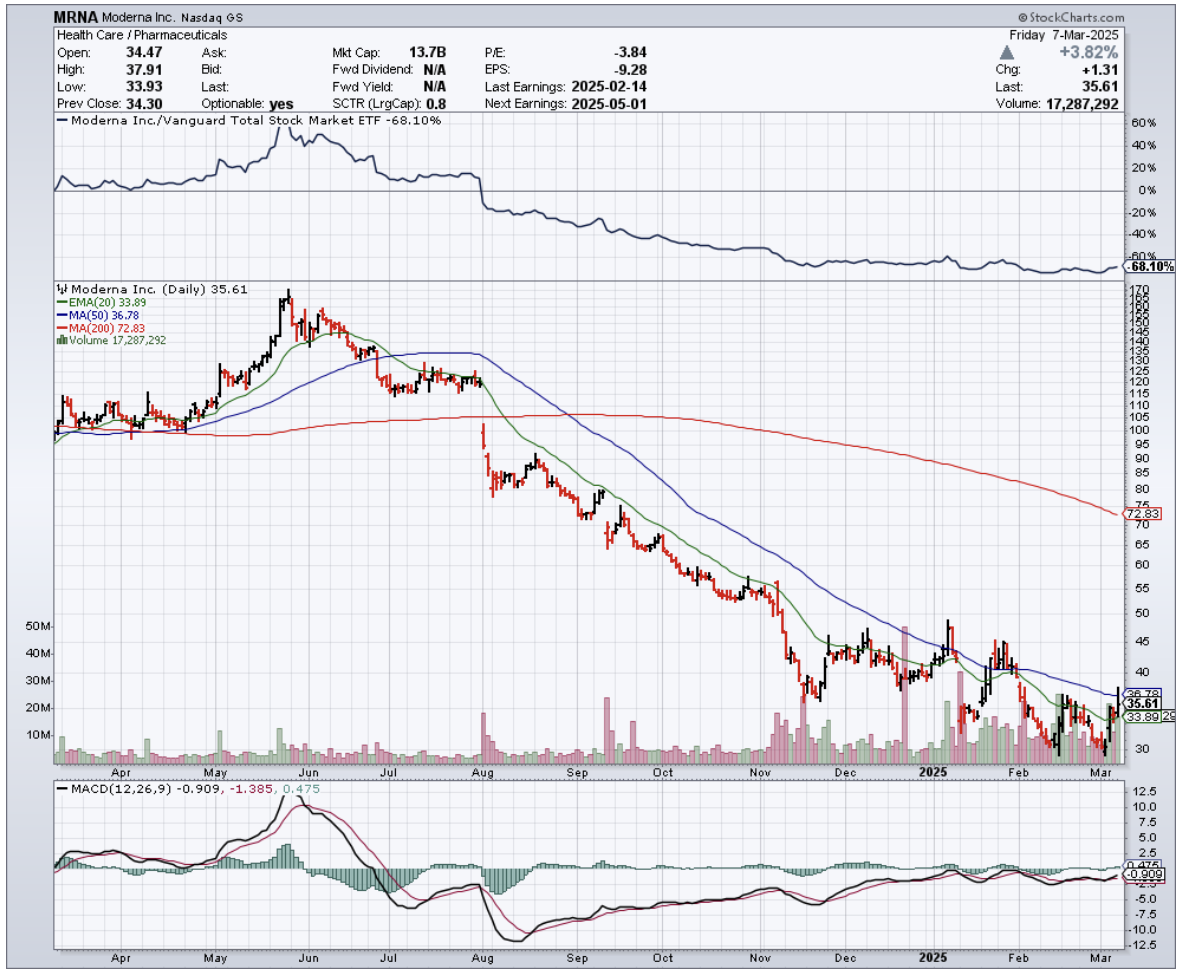When Insiders Go Shopping, Pay Attention
In 1815, Nathan Rothschild made his legendary fortune buying British securities when they were deeply discounted after Waterloo. “Buy when there's blood in the streets,” he allegedly said. That kind of contrarian wisdom has made fortunes across centuries.
Two centuries later, I find myself applying this timeless principle to Moderna (MRNA). The biotech darling has shed over 90% of its value since the pandemic peak, plummeting from $400+ to under $30. And now, insiders are quietly loading up.
The shift in insider activity at Moderna has been striking. Over the past year, insiders unloaded more than 602,000 shares, with the heaviest selling in 2024 when the stock was trading above $120.
One director alone offloaded 202,832 shares in a single transaction, pocketing $30 million. But as Moderna’s share price took a nosedive, insider selling slowed to a trickle. By the time the stock fell below $100, most trades involved fewer than 1,000 shares.
Then, on March 3, the narrative took a dramatic turn: two insiders — including CEO Stéphane Bancel — scooped up nearly 200,000 shares, investing about $6 million. Bancel accounted for $5 million of that sum.
This move is telling. Bancel already controls over 21 million shares. You don’t drop another $5 million into a stock unless you believe you're buying Manhattan for beads and trinkets. The contrast is stark: when prices were high, executives couldn’t sell fast enough. Now, they’re buying.
The timing of these insider purchases is even more intriguing. Moderna had just slashed its 2025 revenue target by $1 billion, bringing guidance down to $2.5 to $3.5 billion. Yet, insiders chose that precise moment to buy, signaling confidence that sales will bottom out this year.
The company's drug pipeline isn't barren, either. Ten drugs are expected to receive FDA approvals by 2027, including a skin cancer vaccine developed with Merck (MRK) slated for a 2027 launch, pending Phase 3 data.
These ten anticipated drugs collectively target a market exceeding $30 billion, with analysts projecting Moderna's revenue to climb to $3.3 billion in 2027 and $4.77 billion by 2028.
On their Q4 '24 earnings call, President Stephen Hoge underscored the cancer vaccine’s potential: "As for INT, obviously, we're all looking forward to the melanoma -- adjuvant melanoma Phase 3 readout. As you know, and as I mentioned, there are additional Phase 3s as well as two randomized Phase 2s, including bladder cancer, renal cell carcinoma, which, depending on the rate of approval of events, could have readouts that we would be updating on as well in the coming years."
Still, the road ahead isn’t without challenges. Moderna expects to burn up to $3.5 billion in cash during 2025, reducing its cash position to $6 billion. Estimated cash costs for 2025 stand at $5.5 billion, projected to decline to $5 billion in 2026.
To reach breakeven by 2028, the company needs to generate $6+ billion in sales at 80% gross margins or implement further cost-cutting measures.
Despite these financial hurdles, Moderna's market cap is a mere $14 billion — practically pocket change for a company with multiple promising vaccine candidates.
There's undeniable risk in buying Moderna at these levels, but historically, the most profitable investments come before the financials improve. The company has effectively announced that its numbers will likely deteriorate further before rebounding — and yet, insiders are still buying.
Speaking of gathering valuable insights from industry leaders, I’ve been preparing for our Mad Hedge Traders & Investors Summit on March 11-13.
After decades in the markets, I’ve learned there’s something uniquely valuable about getting multiple perspectives in one place. It reminds me of my time in Tokyo during the '70s, where real opportunities often emerged from late-night conversations between veteran traders.
Even in today’s volatile environment, the wisdom of those who’ve navigated every market cycle remains invaluable.
In the end, Moderna presents a textbook contrarian opportunity. The stock is deeply out of favor, yet insider buying suggests a potential shift in sentiment as shares hover around $30.
The real question isn’t whether Moderna will recover but whether investors have the stomach to buy when others are still heading for the exits.
As for me, I’m keeping Moderna firmly on my watchlist, right next to my dog-eared copy of "Extraordinary Popular Delusions and the Madness of Crowds."
Some things never change.


